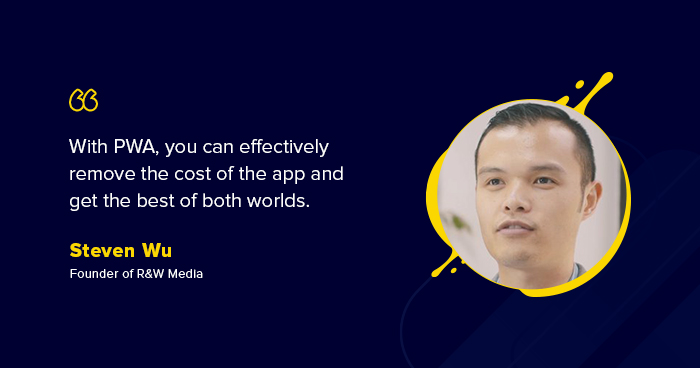
Starting one’s career from scratch as a web developer, launching their own agency, and then scaling it up to become a leading Magento agency in the UK is not child’s play. It includes various setbacks, obstacles, and continuous growing challenges. However, there’s one person who has done it all; and that’s none other than our guest, Steven Wu.
Steven has been through it all, and after overcoming many hurdles and barriers, he is now running a successful Magento agency known as R&W Media. It’s our privilege that Steven will be sharing his journey so far, along with the tips, suggestions, and strategies he followed throughout his career to make his Magento store a huge success.
AbdurRahman: Hi, Steven Wu. It’s lovely to have you with us! Could you please tell our readers a little bit about yourself? Walk us through your journey so far.
Steven: I am honored to be here. Well, I started as a web developer over ten years ago and began to dabble in the ecommerce world. I started to enjoy working on ecommerce websites. You get to see the sites grow and actively generate revenue on a daily basis, and it was a very reactive and exciting world to be in. Soon after leaving my day job, I co-founded my own Magento agency R & W Media and it quickly became one of UK’s leading Magento agencies.
AbdurRahman: Was there a special reason why you chose to work with Magento over the other ecommerce platforms available? What would you say is the importance of using Magento to you?
Steven: Back in the day, the ecommerce platforms around were very weak; they had a lot of limitations and essentially were proprietary software. It was tough to custom build on those platforms or grow the sites using that software. There wasn’t a solid platform to work with. Then came Magento, which was an outstanding open-source platform that had all the capabilities with a fundamental design in development, making customisation more manageable and friendly for development teams. Since I started using it back in 2009, I haven’t looked back, and it’s what my company exclusively specializes in.
AbdurRahman: You have been helping store owners with ecommerce store development. What’s your thought process before getting into any project?
Steven: It always starts by speaking with the client and understanding their business. What are their needs and wants? Then, going away and doing some research on their existing website and performing some competitor analysis. How far behind are they compared to other online stores?
In my mind, I always try to think about how technology can push their business and help them achieve their business goals.
I don’t think of just launching a beautiful store, but a store that actually helps them exceed their expectations and how Magento can help relieve their everyday burdens and make life easier, and most importantly, what piece of technology can help them generate more income.
Many businesses revamp their website or move to a new platform but only to bring their existing problems along with them or create more complexity when building on a new platform. This should never be the case. With Magento, we always strive to design a system that makes their store management easy and friendly.
We never oversell or push a particular technology to a client if we feel it adds very little value to their business. We only suggest what we think will help them exceed online. For example, when it comes to installing personalisation on a Magento store, we would look at implementing Nosto’s AI product recommendation system, or when it comes to marketing, we would recommend integration with DotDigital marketing suite.
AbdurRahman: How would you compare Magento 1 with Magento 2? And how do you plan the process for M1 to M2 services?
Steven: There is a significant technological difference between M1 to M2. It’s advantageous to move your development process to M2. Magento 2 now supports PHP 7, ships with LESS, API at its core, native support for HTML5/CSS3, support for ElasticSearch, in-site PayPal experience, support for Varnish, improved editor with Page Builder, improved security and performance. Magento is now actively releasing new updates on Magento 2, so you’ll regularly have further improvements and new features rolled out.
Over the last few years since the end of Magento 1, we’ve been migrating M1 to M2 successfully. We’ve had some major successful launches. When it comes to moving sites from M1 to M2, it can be complicated and costly. The primary issue is data migration. Some of the client sites we manage have thousands of products, customers and orders. But we’ve fine-tuned this practice using the Data Migration Tool and our in-house development scripts to make this process smooth and pain-free.
When migrating data from M1 to M2, we want to ensure that we won’t be carrying unnecessary legacy data. So, we run through a process to clean up the data, ensuring only the essential and error-free data is brought over to the new environment. This milestone requires a lengthy discussion with the client, and sometimes it depends upon the client to carry out some of the data clearing processes directly.
We identify what is currently not working and any issues the client is experiencing on the existing Magento 1 platform. We look at building a solution that helps eradicate these issues and make their lives easier on Magento 2. From the backend of ease of use, custom functionality and improving the frontend customer experience.
Hardware considerations are crucial topics to ensure the online store meets the requirements, and upon going live there is no major downtime impacting sales
AbdurRahman: What are your thoughts on Headless, PWA, and other related technologies? How are they going to benefit the merchants and ecommerce industry?
Steven: I’ve seen some PWA websites and have been amazed by their success. A few of our clients who have very large multi-stores want to expand their reach into apps. But app development is an entirely new cup of tea and requires a large budget. This also means managing two separate technology platforms, which can be challenging.
But with PWA, you can effectively remove the cost of the app and get the best of both worlds. We’re now seeing more and more merchants adopting PWA, and as Magento’s platform becomes increasingly robust with time, we will soon see PWA website stores being the future for all online stores.
AbdurRahman: What do you think about the Magento community? How important is it for the growth of the Magento platform?
Steven: One of the things that attracted me to Magento all those years ago was that Magento had a large and strong community. Being an open source platform, having an active community is essential. We wouldn’t be here without the community’s support and contribution. We are now seeing more events, social interactions, code contribution, and participation than ever.
Every year we see the popularity of the Magento platform becoming more popular, all thanks to the hype and promotion from the community.
The community also allows us to learn more about Magento and get support when we need it.
Every year we see more new features being released on Magento, with the recent addition of PHP support, better security, and the release of Page Builder on the Open Source edition, all thanks to the wider community base.
AbdurRahman: What are your thoughts on online Magento events and which events are you excited about for this year?
Steven: Since COVID all the events have moved online, which has been great because now more people can attend these events. The latest Meet Magento UK saw the largest number of attendees, with over 1900 tickets sold from over 80 countries.
I’ve always enjoyed and been a supporter of the Meet Magento UK events. They always have great speakers and some major announcements, which greatly impact the Magento ecosystem.
Meet Magento UK, and Magento meetups are what I have missed and I am definitely looking forward to attending them again in-person in the future.
AbdurRahman: How do you think these events improve the Magento experience?
Steven: These events are thriving with community members, and many are run by community leaders. It’s essential for these events to continue, so you can meet, interact, and speak to partners; and with Magento directly.
These events allow Magento to present its latest plans and receive feedback from the wider community.
It is also here that I have met some talented developers. I have hired and made meaningful connections that profoundly affect my business.
Also, it’s just a great place to meet and talk to people who are passionate about ecommerce and Magento to share ideas and have open discussions.
AbdurRahman: Where do you see Magento in the future? Any predictions for 2022?
Steven: We’ll start to see more adoption to AI advancement, which we have already seen with integration of Adobe Experience Cloud. AI will become more intelligent and present products to customers that they may be interested in, before they even know it.
Online stores will branch out of the browser, with the advancement of Progressive Web App (PWA) in Magento 2.4, we’ll be able to browse and interact with stores offline and send push notifications to customers without crowding their mailboxes.
When searching for products, we won’t just use Google or on-site search; customers will be using voice search or visual search, as social media platforms are gaining popularity in this area.
Another inspiring feature from social media is live streaming. Since COVID, customers were left at home, so connecting with customers was challenging. By allowing live streaming, merchants can now present demos of their products, connect, and answer customer questions directly.
AbdurRahman: Cloudways provides 1-Click Magento installation with impressive speed and top-tier cloud infrastructures embedded within the platform. Would you prefer shared hosting for Magento stores or a managed cloud hosting environment like Cloudways?
Steven: Definitely managed hosting! We would never recommend shared hosting to our clients. Magento is a feature rich ecommerce platform. Being such a large application, it is also very resource hungry. We’ve seen significant performance problems when a Magento site is hosted on a shared server. Another major drawback using shared hosting is when another store on the same server gets a spike in traffic your own store is profoundly affected without any control.
We would only recommend Magento hosted on a cloud platform or dedicated server. It’s much more secure, faster, scalable and reliable.
For the peace of mind, you definitely want a managed solution. No more pointless monitoring and backups. You want to focus on your business and not having to think about tedious IT tasks on managing your own server, especially when things go wrong. That is why we would work with industry leaders when it comes to Magento hosting.
AbdurRahman: Can you please share a picture of your workplace? And any tips on how to make a productive workstation since many of us are still working from home.
Steven: With the country now getting back to normal, the majority of us are still working from home. I myself am back working in the London office.
But during the lockdown, I managed to set up my home office and be very productive. One of the difficulties working from home is the constant noise and distractions. So you will want to carve out a space at home for a workspace that is quiet and distraction-free. Set specific work times and inform your family not to disturb you during this time. Turn off the TV, and block sites such as Facebook and Twitter to stop you from distraction.
Being laser focused on your work without outside distractions, will help you work better and feel like you’re working back at the office, and be just as productive.
AbdurRahman: Who are the top influencers that inspire you?
Steven: Any websites that are pushing the boundary of technology truly inspires me. I’ve seen some great brands who are truly creative in terms of what you can do with Magento and pushing its limits. Examples such as
- Bulk – https://www.bulk.com/uk/
- Brewdog – https://www.brewdog.com/uk/
- End Clothing – https://www.endclothing.com/gb
- Barbour – https://www.barbour.com/uk/
- Paul Smith – https://www.paulsmith.com/uk
There are so many things you can learn from these websites.
And of course, as always, Amazon. Amazon may not look the most aesthetically pleasing, But they maintain focus on user experience. Many of the traditions you see on online stores today stem from Amazon, which continues to pave the way for better online shopping.
AbdurRahman: What does your work-life balance look like? Are there any activities you enjoy in your spare hours? You may share any pictures of yourself that you like here!
Steven: Because I spend a lot of time in front of the computer and on my phone for business purposes, I try to leave work behind as soon as the office closes. I balance it out by attending to a lot of activities outside of work. I like to do climbing, Muay Thai, gym and shooting on the weekends. On weekends, I also like to visit friends as it helps me get away from the work mindset, allowing me to relax and be refreshed once I return to work the following week.
AbdurRahman: What resources do you think newbies would find helpful when learning Magento development?
Steven: Magento is trying to help the community grow, so they have massive resources to help newbies coming in. So, I would suggest newbies to always look at their developer guide https://devdocs.magento.com/ and their helpful resources https://experienceleague.adobe.com/docs/commerce.html.
All of our developers are trained following Magento’s training program, which is a great place to have developers fully immerse and understand the ins and outs of Magento.
Again, thank you so much for your time. You’re always kind to me 🙂
Abdur Rahman
Abdur Rahman is the Magento whizz at Cloudways. He is growth ambitious, and aims to learn & share information about Ecommerce & Magento Development through practice and experimentation. He loves to travel and explore new ideas whenever he finds time. Get in touch with him at [email protected]


